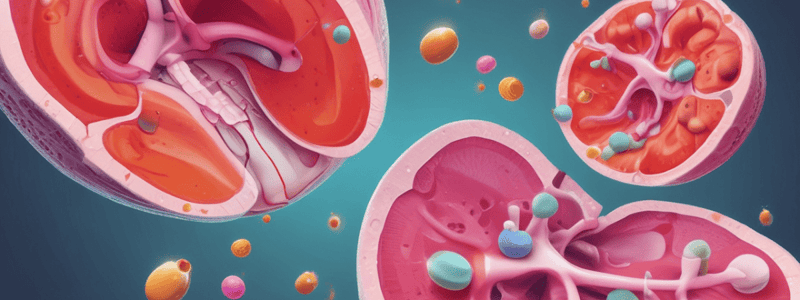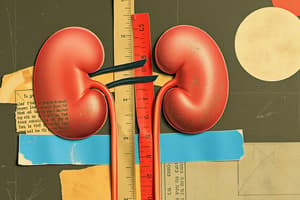Podcast
Questions and Answers
What is the main reason why weight loss through low-calorie diets and bariatric surgery can increase the risk of kidney stones?
What is the main reason why weight loss through low-calorie diets and bariatric surgery can increase the risk of kidney stones?
- They decrease the amount of dietary calcium, leading to higher urine calcium levels.
- They alter the balance of gut bacteria, which can increase the absorption of oxalate.
- They reduce the production of citrate in the urine, which inhibits stone formation.
- They reduce urine volume and increase urine concentration of stone-forming substances. (correct)
Which of the following is the recommended daily allowance for dietary protein to help prevent kidney stone formation?
Which of the following is the recommended daily allowance for dietary protein to help prevent kidney stone formation?
- 2.0 g/kg
- 0.5 g/kg
- 1.2 g/kg
- 0.8 g/kg (correct)
Which of the following is the recommended daily intake for sodium to help prevent kidney stone recurrence?
Which of the following is the recommended daily intake for sodium to help prevent kidney stone recurrence?
- 2.3 g (correct)
- 1.5 g
- 2.0 g
- 3.0 g
What is the primary reason why it is preferable to obtain dietary calcium from natural food sources rather than supplements?
What is the primary reason why it is preferable to obtain dietary calcium from natural food sources rather than supplements?
Which of the following is the primary reason why dietary and lifestyle habits have a significant impact on kidney stone development?
Which of the following is the primary reason why dietary and lifestyle habits have a significant impact on kidney stone development?
What is the main recommendation for patients with calcium oxalate stones and calcium hypercalciuria?
What is the main recommendation for patients with calcium oxalate stones and calcium hypercalciuria?
What is the main purpose of using potassium alkali as a urinary agent?
What is the main purpose of using potassium alkali as a urinary agent?
In patients with hypocitraturia, what is a recommended action related to the use of potassium alkali therapy?
In patients with hypocitraturia, what is a recommended action related to the use of potassium alkali therapy?
What is a contraindication for using potassium alkali as a urinary agent?
What is a contraindication for using potassium alkali as a urinary agent?
Which statement about ascorbic acid and methionine as urinary agents is supported by the text?
Which statement about ascorbic acid and methionine as urinary agents is supported by the text?
What effect does potassium alkali have on calcium salt saturation in urine?
What effect does potassium alkali have on calcium salt saturation in urine?
What is the primary intervention to prevent stone formation according to the text?
What is the primary intervention to prevent stone formation according to the text?
Which of the following has protective effects against stone formation, according to the text?
Which of the following has protective effects against stone formation, according to the text?
Which of the following has been observed to have an equivalent decrease in urinary calcium and increase in urinary citrate according to a recent trial?
Which of the following has been observed to have an equivalent decrease in urinary calcium and increase in urinary citrate according to a recent trial?
What type of fluid intake is associated with an increased risk of stone formation, according to the epidemiological evidence mentioned in the text?
What type of fluid intake is associated with an increased risk of stone formation, according to the epidemiological evidence mentioned in the text?
What is the typical dosage range for thiazide diuretics used in treating urinary stone disease?
What is the typical dosage range for thiazide diuretics used in treating urinary stone disease?
Which of the following is NOT a key determinant for preventing calcium stones according to the text?
Which of the following is NOT a key determinant for preventing calcium stones according to the text?
What method is used to assess the risk of stone formation from crystallization of solutes where sophisticated computerized methods are not practical?
What method is used to assess the risk of stone formation from crystallization of solutes where sophisticated computerized methods are not practical?
"Chronic low fluid intake" is associated with what significant risk factor for stone development?
"Chronic low fluid intake" is associated with what significant risk factor for stone development?
What is the primary reason for avoiding restrictive diets in stone prevention according to the text?
What is the primary reason for avoiding restrictive diets in stone prevention according to the text?
What intervention has been known to prevent stone formation by lowering urinary saturations of calcium oxalate and uric acid in specific patients?
What intervention has been known to prevent stone formation by lowering urinary saturations of calcium oxalate and uric acid in specific patients?




